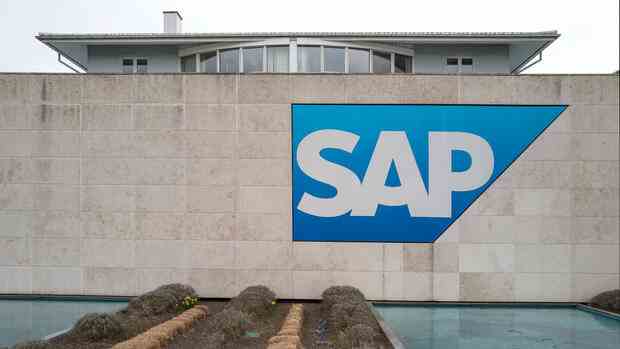Berlin Whether in autonomous driving, controlling energy networks or coordinating supply chains: the intelligent use of data is becoming increasingly important in business. Twelve member states of the European Union (EU) therefore want to have a digital infrastructure developed for the continent together with the Commission – Germany and France are taking the lead.
Implementation can begin around two years after the initial planning: The Federal Ministry of Economics has approved a project by SAP that is intended to lay the foundation for the new infrastructure. The software manufacturer can now “start with its project before the European Commission’s final aid decision,” the ministry explained to the Handelsblatt – which is still pending.
“Speed is crucial for the success of European industrial policy,” Economics Minister Robert Habeck (Greens) told the Handelsblatt. The SAP project lays important foundations for the digital infrastructure and many associated sub-projects, which is why the ministry approves the start. The federal government is investing a total of 750 million euros in funding for SAP and the other planned projects.
The aim of the EU project is to create a uniform infrastructure for data exchange in real time, independent of individual providers and across national borders. This should enable the economy to develop new business models, for example in the mobility and energy industries or in healthcare.
The technology for this has long been available. Companies can process data centrally in the cloud or in small on-site data centers. However, this market is dominated by American companies such as Amazon Web Services (AWS) and Microsoft. In Berlin and Brussels, people fear a dangerous dependency – and want to counteract it.
Industrial policy of a special kind
A special instrument of industrial policy is used here: The EU has declared the development of a new cloud infrastructure as an “Important Project of Common European Interest”, or IPCEI for short. This classification as a project of common European interest gives member states the opportunity to financially support the companies involved, contrary to the actually applicable EU rules.
Thanks to the approval from Habeck’s ministry, SAP can start work even without the final decision of the EU Commission.
>> Read here: Coalition climate hits new low
“The IPCEI is an industrial policy impulse to address the increasing relevance of edge computing,” says Lukas Klingholz, who heads the Cloud and Artificial Intelligence team at Bitkom. Decentralized data processing is advantageous or even essential for many applications, for example for data analysis in production or autonomous driving.
What should be important for the Green politician Habeck: The IT industry promises that decentralized data processing will ensure energy savings – the project should thus contribute to the “Green Deal” of the EU.
The funding is not without controversy within the EU. There are conflicts of interest between industry and competition policy, which is reflected in the long approval procedures. Economics Minister Habeck is therefore putting pressure on: The IPCEI is “a central project for our goal of expanding and securing European digital sovereignty”. The speedy approval of state aid” therefore has “high priority”.
SAP develops a blueprint
Thanks to the approval from Habeck’s ministry, SAP can start work even without the final decision of the EU Commission. The software manufacturer has a special role in the construct, in which 150 companies and research institutes from twelve EU member states are involved: it is to develop a reference architecture, i.e. a blueprint for the infrastructure.
The vision: Other cloud providers and IT service providers should use these modules in their own data centers and thus be able to provide a uniform infrastructure throughout Europe. However, it will likely take years before the technology is put to productive use. When asked, SAP explained that its own project was initially designed for 4.5 years.
>> Read here: SAP and machine builders build cloud platform for industry
The IPCEI is linked to another major European project: It is intended to use the set of rules developed by the Gaia-X consortium. It should help that many companies are active in both projects – sometimes even with the same people.
SAP specializes in controlling business processes, and the Walldorf-based group is one of the leading providers in supply chain management. The management around spokesman Christian Klein is investing heavily in this area, for example with the Catena-X platform, which is intended to make networking easier for the automotive industry. Now another project is added.
More: How SAP wants to build a cloud for the federal government
